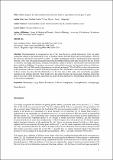Files in this item
Global change in the functional diversity of marine fisheries exploitation over the past 65 years
Item metadata
| dc.contributor.author | Trindade Santos, Isaac | |
| dc.contributor.author | Moyes, Faye Helen | |
| dc.contributor.author | Magurran, Anne | |
| dc.date.accessioned | 2020-08-28T12:30:01Z | |
| dc.date.available | 2020-08-28T12:30:01Z | |
| dc.date.issued | 2020-08-26 | |
| dc.identifier | 269824586 | |
| dc.identifier | 730897d6-212b-41f1-919f-124bb8535e77 | |
| dc.identifier | 85089646063 | |
| dc.identifier | 000563925900018 | |
| dc.identifier.citation | Trindade Santos , I , Moyes , F H & Magurran , A 2020 , ' Global change in the functional diversity of marine fisheries exploitation over the past 65 years ' , Proceedings of the Royal Society B: Biological Sciences , vol. 287 , no. 1933 , 20200889 . https://doi.org/10.1098/rspb.2020.0889 | en |
| dc.identifier.issn | 0962-8452 | |
| dc.identifier.other | ORCID: /0000-0002-0036-2795/work/79564839 | |
| dc.identifier.other | ORCID: /0000-0001-9687-0593/work/79564858 | |
| dc.identifier.uri | https://hdl.handle.net/10023/20523 | |
| dc.description | Funding: CAPES (Coordination for the Improvement of Higher Education Personnel), process number: #88881.129579/2016–01 (Finance Code 001). A.E.M. and F.M.thank the ERC (ERC AdG BioTIME 250189 and ERC PoC BioCHANGE 727440) and the Leverhulme Trust (RPG-2019–402) for support. | en |
| dc.description.abstract | Overexploitation is recognized as one of the main threats to global biodiversity. Here, we report a widespread change in the functional diversity of fisheries catches from the large marine ecosystems (LMEs) of the world over the past 65 years (1950 to 2014). The spatial and temporal trends of functional diversity exploited from the LMEs were calculated using global reconstructed marine fisheries catch data provided by the Sea Around Us initiative (including subsistence, artisanal, recreational, industrial fisheries, and discards) and functional trait data available in FishBase. Our analyses uncovered a substantial increase in the functional richness of both ray-finned fishes (80% of LMEs) and cartilaginous species (sharks and rays) (75% of LMESs), in line with an increase in the taxonomic richness, extracted from these ecosystems. The functional evenness and functional divergence of these catches have also altered substantially over the time span of this study, with considerable geographic variation in the patterns detected. These trends show that global fisheries are increasingly targeting species that play diverse roles within the marine ecosystem and underline the importance of incorporating functional diversity in ecosystem management. | |
| dc.format.extent | 8 | |
| dc.format.extent | 761306 | |
| dc.language.iso | eng | |
| dc.relation.ispartof | Proceedings of the Royal Society B: Biological Sciences | en |
| dc.subject | Biodiversity | en |
| dc.subject | Large marine ecosystems | en |
| dc.subject | Fisheries management | en |
| dc.subject | Overexploitation | en |
| dc.subject | Actinopterygii | en |
| dc.subject | Elasmobranchii | en |
| dc.subject | GC Oceanography | en |
| dc.subject | QH301 Biology | en |
| dc.subject | SH Aquaculture. Fisheries. Angling | en |
| dc.subject | DAS | en |
| dc.subject | BDC | en |
| dc.subject | R2C | en |
| dc.subject | SDG 14 - Life Below Water | en |
| dc.subject.lcc | GC | en |
| dc.subject.lcc | QH301 | en |
| dc.subject.lcc | SH | en |
| dc.title | Global change in the functional diversity of marine fisheries exploitation over the past 65 years | en |
| dc.type | Journal article | en |
| dc.contributor.sponsor | European Research Council | en |
| dc.contributor.sponsor | European Research Council | en |
| dc.contributor.institution | University of St Andrews. School of Biology | en |
| dc.contributor.institution | University of St Andrews. Centre for Biological Diversity | en |
| dc.contributor.institution | University of St Andrews. Marine Alliance for Science & Technology Scotland | en |
| dc.contributor.institution | University of St Andrews. Scottish Oceans Institute | en |
| dc.contributor.institution | University of St Andrews. Institute of Behavioural and Neural Sciences | en |
| dc.contributor.institution | University of St Andrews. St Andrews Sustainability Institute | en |
| dc.contributor.institution | University of St Andrews. Fish Behaviour and Biodiversity Research Group | en |
| dc.contributor.institution | University of St Andrews. Centre for Research into Ecological & Environmental Modelling | en |
| dc.identifier.doi | 10.1098/rspb.2020.0889 | |
| dc.description.status | Peer reviewed | en |
| dc.identifier.grantnumber | 250189 | en |
| dc.identifier.grantnumber | 727440 | en |
This item appears in the following Collection(s)
Items in the St Andrews Research Repository are protected by copyright, with all rights reserved, unless otherwise indicated.

